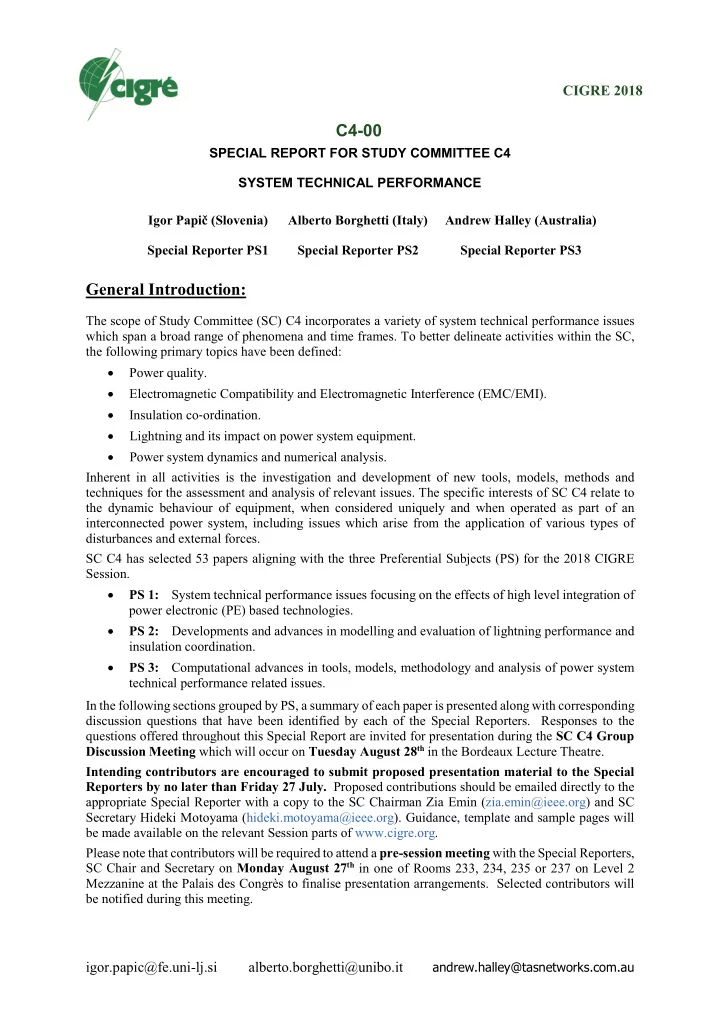

CIGRE 2018 C4-00 SPECIAL REPORT FOR STUDY COMMITTEE C4 SYSTEM TECHNICAL PERFORMANCE Igor Papič (Slovenia) Alberto Borghetti (Italy) Andrew Halley (Australia) Special Reporter PS1 Special Reporter PS2 Special Reporter PS3 General Introduction: The scope of Study Committee (SC) C4 incorporates a variety of system technical performance issues which span a broad range of phenomena and time frames. To better delineate activities within the SC, the following primary topics have been defined: • Power quality. • Electromagnetic Compatibility and Electromagnetic Interference (EMC/EMI). • Insulation co ‐ ordination. • Lightning and its impact on power system equipment. • Power system dynamics and numerical analysis. Inherent in all activities is the investigation and development of new tools, models, methods and techniques for the assessment and analysis of relevant issues. The specific interests of SC C4 relate to the dynamic behaviour of equipment, when considered uniquely and when operated as part of an interconnected power system, including issues which arise from the application of various types of disturbances and external forces. SC C4 has selected 53 papers aligning with the three Preferential Subjects (PS) for the 2018 CIGRE Session. • PS 1: System technical performance issues focusing on the effects of high level integration of power electronic (PE) based technologies. • PS 2: Developments and advances in modelling and evaluation of lightning performance and insulation coordination. • PS 3: Computational advances in tools, models, methodology and analysis of power system technical performance related issues. In the following sections grouped by PS, a summary of each paper is presented along with corresponding discussion questions that have been identified by each of the Special Reporters. Responses to the questions offered throughout this Special Report are invited for presentation during the SC C4 Group Discussion Meeting which will occur on Tuesday August 28 th in the Bordeaux Lecture Theatre. Intending contributors are encouraged to submit proposed presentation material to the Special Reporters by no later than Friday 27 July. Proposed contributions should be emailed directly to the appropriate Special Reporter with a copy to the SC Chairman Zia Emin (zia.emin@ieee.org) and SC Secretary Hideki Motoyama (hideki.motoyama@ieee.org). Guidance, template and sample pages will be made available on the relevant Session parts of www.cigre.org. Please note that contributors will be required to attend a pre-session meeting with the Special Reporters, SC Chair and Secretary on Monday August 27 th in one of Rooms 233, 234, 235 or 237 on Level 2 Mezzanine at the Palais des Congrès to finalise presentation arrangements. Selected contributors will be notified during this meeting. igor.papic@fe.uni-lj.si alberto.borghetti@unibo.it andrew.halley@tasnetworks.com.au
The authors of the SC C4 session papers are required to present their papers during the SC C4 Poster Session scheduled for Friday morning August 31 st in Halle Ternes. Instructions on preparation will be available on the CIGRE website. Posters will be displayed on digital screens. A final copy will need to be forwarded to the SC C4 Poster Session convener Filipe Faria Da Silva (ffs@et.aau.dk) with a copy to the SC Chairman and Secretary by no later than Friday 27 July . Preferential Subject 1 The theme for PS1 is “ System technical performance issues focusing on the effects of high level integration of power electronic based technologies ” which includes: • Power system stability control, with particular emphasis on frequency and voltage control systems of converter based energy sources including their modelling and performance and challenges on series compensation and impact of microgrids. • Analysis, measurement, benchmarking and standardisation of power quality. • EMC aspects of future power networks including ELF exposures. Summary of submitted papers Twenty six (26) papers were accepted in response to PS1. The papers originated from seventeen (17) countries reflecting a wide and international interest in the topics. The papers present concepts and results that broadly align with the three subgroups defined by the SC as follows: • Subcategory one: 12 papers 102, 105, 106, 112, 115, 117, 118, 119, 120, 121, 124 and 125. • Subcategory two: 12 papers 101, 104, 107, 108, 109, 110, 111, 113, 114, 122, 126 and 127. • Subcategory three: 2 papers 103 and 116. PS1: Subcategory one Power system stability control with particular emphasis on frequency and voltage control systems of converter based energy sources including their modelling and performance and challenges on series compensation and impact of microgrids. C4-102: On steady-state voltage standards with high-penetration of distributed energy resources. This paper describes some common U.S. and European standards that define voltage magnitude ranges. Standards were developed for distribution systems that were characterised by limited visibility and unidirectional power flows. These characteristics are rapidly changing with the on-going roll out of advanced metering infrastructure (AMI) and increasing penetration of distributed energy resources (DER). Addressing this issue requires improved understanding of how changing system operations, and increasing visibility are accounted for or how they may impact existing voltage range standards. This review examines differences in how these standards address voltage range magnitudes as well as the frequency of excursions. Also summarised are some of the known impacts that steady-state voltage excursions have on electrical equipment, as well as identifying the need for further testing and analysis of new and emerging end-use technologies. C4-105: Investigation of processes during single-phase auto reclosing on transmission lines with controlled shunt reactors. This paper describes magnetically controlled shunt reactors (MCSR) that are used in the power systems of many countries for voltage stabilisation and for increasing the throughput capacity of transmission lines. The paper discusses the sizing of parameters according to the secondary arc current limitation and the required rate of response of MCSR’s. Also presented are analyses of MCSR phase currents during the reclosing dead time, faulted phase current dependence on the reactance of the neutral reactor and its operating modes. A mathematical expression is obtained for determining the reactance of the neutral 2
Recommend
More recommend